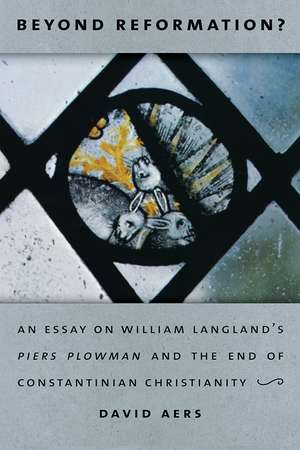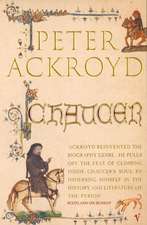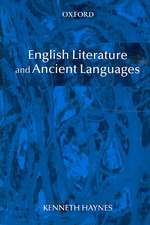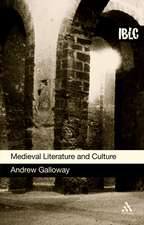Beyond Reformation? – An Essay on William Langland′s Piers Plowman and the End of Constantinian Christianity
Autor David Aersen Limba Engleză Paperback – 14 noi 2015
In Beyond Reformation? An Essay on William Langland’s Piers Plowman and the End of Constantinian Christianity, David Aers presents a sustained and profound close reading of the final version of William Langland’s Piers Plowman, the most searching Christian poem of the Middle Ages in English. His reading, most unusually, seeks to explore the relations of Langland's poem to both medieval and early modern reformations together with the ending of Constantinian Christianity.
Aers concentrates on Langland’s extraordinarily rich ecclesiastic politics and on his account of Christian virtues and the struggles of Conscience to discern how to go on in his often baffling culture. The poem’s complex allegory engages with most institutions and forms of life. In doing so, it explores moral languages and their relations to current practices and social tendencies. Langland’s vision conveys a strange sense that in his historical moment some moral concepts were being transformed and some traditions the author cherished were becoming unintelligible. Beyond Reformation? seeks to show how Langland grasped subtle shifts that were difficult to discern in the fourteenth century but were to become forces with a powerful future in shaping Western Christianity.
The essay form that Aers has chosen for his book contributes to the effectiveness of the argument he develops in tandem with the structure of Langland’s poem: he sustains and tests his argument in a series of steps or “passus,” a Langlandian mode of proceeding. His essay unfolds an argument about medieval and early modern forms of Constantinian Christianity and reformation, and the way in which Langland's own vision of a secularizing, de-Christianizing late medieval church draws him toward the idea of a church of “fools,” beyond papacy, priesthood, hierarchy, and institutions. For Aers, Langland opens up serious diachronic issues concerning Christianity and culture. His essay includes a brief summary of the poem and modern translations alongside the original medieval English. It will challenge specialists on Langland's poem and supply valuable resources of thought for anyone who continues to struggle with the church of today.
“David Aers, as a master interpreter, shows us how he reads Langland and, while doing so, instructs us in how to read. His brilliant essay models for us how it is possible, and indeed desirable, to open the usually well-policed border between theological reflection and literary analysis and thereby aim at a fuller reading of what a life of faith encompasses. Along the way, we gain an appreciation of William Langland’s formidable Middle English epic masterpiece, Piers Plowman, and the riches it repays our careful attention.”
—James Wetzel, Augustinian Endowed Chair in the thought of St. Augustine and Professor of Philosophy, Villanova University
Aers concentrates on Langland’s extraordinarily rich ecclesiastic politics and on his account of Christian virtues and the struggles of Conscience to discern how to go on in his often baffling culture. The poem’s complex allegory engages with most institutions and forms of life. In doing so, it explores moral languages and their relations to current practices and social tendencies. Langland’s vision conveys a strange sense that in his historical moment some moral concepts were being transformed and some traditions the author cherished were becoming unintelligible. Beyond Reformation? seeks to show how Langland grasped subtle shifts that were difficult to discern in the fourteenth century but were to become forces with a powerful future in shaping Western Christianity.
The essay form that Aers has chosen for his book contributes to the effectiveness of the argument he develops in tandem with the structure of Langland’s poem: he sustains and tests his argument in a series of steps or “passus,” a Langlandian mode of proceeding. His essay unfolds an argument about medieval and early modern forms of Constantinian Christianity and reformation, and the way in which Langland's own vision of a secularizing, de-Christianizing late medieval church draws him toward the idea of a church of “fools,” beyond papacy, priesthood, hierarchy, and institutions. For Aers, Langland opens up serious diachronic issues concerning Christianity and culture. His essay includes a brief summary of the poem and modern translations alongside the original medieval English. It will challenge specialists on Langland's poem and supply valuable resources of thought for anyone who continues to struggle with the church of today.
“David Aers, as a master interpreter, shows us how he reads Langland and, while doing so, instructs us in how to read. His brilliant essay models for us how it is possible, and indeed desirable, to open the usually well-policed border between theological reflection and literary analysis and thereby aim at a fuller reading of what a life of faith encompasses. Along the way, we gain an appreciation of William Langland’s formidable Middle English epic masterpiece, Piers Plowman, and the riches it repays our careful attention.”
—James Wetzel, Augustinian Endowed Chair in the thought of St. Augustine and Professor of Philosophy, Villanova University
| Toate formatele și edițiile | Preț | Express |
|---|---|---|
| Paperback (1) | 248.82 lei 6-8 săpt. | |
| MR – University of Notre Dame Press – 14 noi 2015 | 248.82 lei 6-8 săpt. | |
| Hardback (1) | 589.86 lei 6-8 săpt. | |
| MR – University of Notre Dame Press – 14 ian 2022 | 589.86 lei 6-8 săpt. |
Preț: 248.82 lei
Nou
Puncte Express: 373
Preț estimativ în valută:
47.62€ • 49.19$ • 39.63£
47.62€ • 49.19$ • 39.63£
Carte tipărită la comandă
Livrare economică 25 martie-08 aprilie
Preluare comenzi: 021 569.72.76
Specificații
ISBN-13: 9780268020460
ISBN-10: 0268020469
Pagini: 278
Dimensiuni: 153 x 228 x 18 mm
Greutate: 0.39 kg
Ediția:1
Editura: MR – University of Notre Dame Press
ISBN-10: 0268020469
Pagini: 278
Dimensiuni: 153 x 228 x 18 mm
Greutate: 0.39 kg
Ediția:1
Editura: MR – University of Notre Dame Press
Recenzii
“As a biblical scholar and historian of ancient Christianity, I knew next to nothing about Piers Plowman before reading David Aers’s completely accessible book, but I feel I have learned a huge amount from it. This magisterial and powerful exposition is certainly informative about a period of pre-Reformation English religious and political history not well known to many of us. But it is also timely for today. The book demonstrates how relevant Piers Plowman is, at least in Aers’s interpretation, for current epistemology, ecclesiology, politics, and religion.” —Dale Martin, Woolsey Professor of Religious Studies, Yale University
“David Aers, as a master interpreter, shows us how he reads Langland and, while doing so, instructs us in how to read. His brilliant essay models for us how it is possible, and indeed desirable, to open the usually well-policed border between theological reflection and literary analysis and thereby aim at a fuller reading of what a life of faith encompasses. Along the way, we gain an appreciation of William Langland’s formidable Middle English epic masterpiece, Piers Plowman, and the riches it repays our careful attention." —James Wetzel, Augustinian Endowed Chair in the Thought of St. Augustine and Professor of Philosophy, Villanova University
"Beyond Reformation? is a remarkable book by a master who has creatively invented a form to match and elucidate its complex and compelling object of attention. The book is designed for all readers interested in late medieval English and early modern literary and theological culture. Many scholars will read it, especially scholars of Middle English literature. It is less an introduction than a re-introduction of an extraordinary and very readable kind. I expect it to be received with lively acclaim within that large field." —James Simpson, Donald P. and Katherine B. Loker Professor of English, Harvard University
"Beyond Reformation? is a singular and immensely rewarding book, a theological meditation on the nature of the Church and the Christian life by means of a close engagement with the Middle-English poem Piers Plowman. Difficult to summarize, the book reads as something of a marvelous fugue, with themes and authors appearing, disappearing, and reappearing transformed into new guises as author David Aers imitates the dialectical processes of his poetic subject." —Reading Religion
“For those of us who have committed ourselves to the life-long study of the poem, Aers’ book offers a refreshingly clean and straightforward take on it—one that focuses on . . . a strong and consistent through-line that has consequences not only for us as readers of the poem, but also for us as sometimes unwilling participants in massive and coercive hierarchies of power.” —The Medieval Review
Notă biografică
David Aers is James B. Duke Professor of English and Historical Theology with appointments in both the English Department and in the Divinity School at Duke University. His many publications include Sanctifying Signs: Making Christian Tradition in Late Medieval England (2004) and Salvation and Sin: Augustine, Langland, and Fourteenth-Century Theology (2009), both published by the University of Notre Dame Press.

















